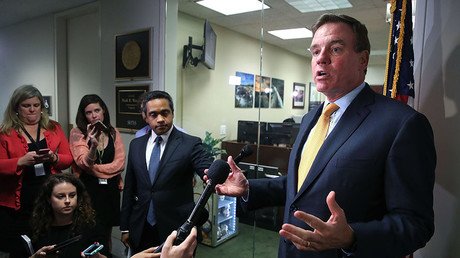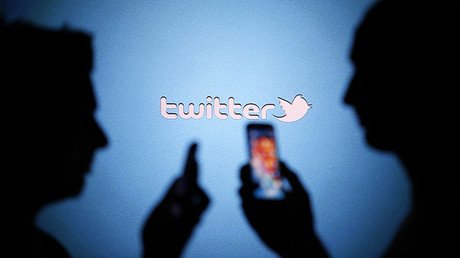'Is it propaganda if you agree with it?' Twitter warns RT contributors about 'Russian bots'
Twitter has sent warning letters to hundreds of thousands of subscribers that their accounts have been spotted retweeting or liking "Russian propaganda." RT contributors were among the recipients, and they are not amused.
On Friday, Twitter began notifying some 677,775 users who liked or retweeted messages from the newly suspended 'Russian bot' accounts that they have fallen victim to Russian propaganda.
Frequent guests on RT were among the first to receive such warnings. Among them, Joe Lauria, independent journalist, author and former Wall Street Journal correspondent, journalist Rania Khalek, and political comedian Tim Young. Daniel McAdams, executive director of the Ron Paul Institute was also singled out by the San Francisco based company.
0.016% of accounts: Twitter catches a few more 'Russian trolls' as Congress-spurred hunt continues https://t.co/REvfQbuKSEpic.twitter.com/joy9RfDE5d
— RT (@RT_com) January 20, 2018
"We are emailing you because we have reason to believe that you either followed one of these accounts or retweeted or liked content from these accounts during the election period," Twitter said. "We are sharing this information so that you can learn more about these accounts and the nature of the Russian propaganda effort."
"Twitter’s criteria identifying these accounts is extremely questionable. If you care about free speech, this should alarm you," Khalek said, retweeting Twitter's notification.
I received this bizarre message from twitter warning me that I may have retweeted something from a Russian propaganda account. Twitter’s criteria identifying these accounts is extremely questionable. If you care about free speech, this should alarm you pic.twitter.com/nzkS5oT3ty
— Rania Khalek (@RaniaKhalek) January 20, 2018
"In total, during the time period we investigated, the 3,814 identified IRA-linked accounts posted 175,993 Tweets, approximately 8.4% of which were election-related," Twitter said Friday, also announcing that it deleted 1,062 linked accounts connected to the Internet Research Agency (IRA), which the social media company accused of influencing the 2016 US Presidential election. Now, anyone who has links to these accounts are being told their activity has been noted.
"Twitter telling me they've deleted an account I follow 'for my own good' because they kinda suspect it might be tied somehow to some Russian internet agency. Then they say, 'People come to Twitter to see what's happening in the world.' Gee, thanks guys," McAdams wrote.
So I got an email from Twitter telling me they've deleted an account I follow "for my own good" because they kinda suspect it might be tied somehow to some Russian internet agency. Then they say "People come to Twitter to see what's happening in the world." Gee...thanks guys... pic.twitter.com/O2BxaMWT3j
— Daniel McAdams (@DanielLMcAdams) January 20, 2018
"I'm here to complain. I can't believe I was singled out in all this, it makes no sense," Young told RT. "It really does not make sense, but it plays into the old, now one year old or longer conspiracy theory that the Russian government colluded with the Trump campaign, which there is still no evidence of."
Young found Twitter's letter especially odd because the comedian cannot "recall retweeting or liking something that I would have viewed as Russian propaganda to have Donald Trump elected and manipulate the election."
He noted that the so-called propaganda messages which Twitter are warning users about could have been written by any American. In fact, Twitter itself said Friday that content linked to the Russian bots represented only under two one-hundredths of a percent (0.016%) of the total accounts on Twitter at the time of the election.
"Is it a propaganda tool if you agree with what you are liking and retweeting?" Young wants to know.
"I'm not sure who is being influenced as an American, especially by the tweets that they've shown in a few example tweets. And a lot of them were just basic political messages that anyone in America could have come up with."
Twitter talking down to people, as if they are not intelligent enough – political commentator https://t.co/AtuTnesVuRpic.twitter.com/5fepIkOlzU
— RT (@RT_com) January 20, 2018
"So I think that Twitter and a lot of the Democrats just think that Americans are extremely stupid."
As a comedian, Young noted, he tweets plenty of political content which can be misinterpreted as propaganda. "It is nearly impossible to be able to show what is actually political propaganda because in an election cycle anything can be considered political propaganda," he said.














